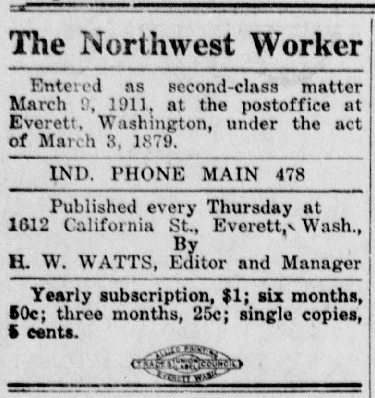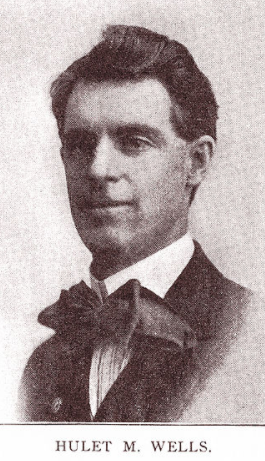True patriotism hates injustice
in its own land
more than anywhere else.
-Clarence Darrow
Hellraisers Journal, Friday September 28, 1917
Everett, Washington – Editor Watts Warned of Warrant
From The Northwest Worker of September 27, 1917:
HOW THEY LOVE US
We are informed by “Red” Doran I. W. W. organizer, that he has seen a warrant that has been issued for the arrest of ye editor [H. W. Watts], three other Socialists and four I. W. W. It seems too bad that the authorities will persist in disturbing us from our peaceful pursuits. We have been in jail four times already and if they keep it up it will soon be like home to us. Guess we must be too autocratic and they want to get us out of the way in order that America might be “made safe for Democracy.” We know, dear reader, that you are sick and tired of hearing that term, but it is the only string the jingoes have on their fiddle and we want to help them fiddle it so that it will wear out.
———-
Hung Jury in Wells-Sadler Case:
WELLS JURY DISAGREES
After deliberations lasting 17½ hours, the jurors in the Wells-Sadler-Fislerman case were unable to agree upon a verdict [on the charge of conspiracy to obstruct the national defense act] and were discharged by Federal Judge Neterrer. Aaron Fislerman was acquitted.
Mr. Vanderveer, the defendant’s attorney, stated that it would be very unlikely that the case would be retried.
A round of applause was given Hulet M. Wells in the court room after delivering an address to the jury. The Court ordered all those who applauded out of court.
One woman went out saying, “To hear that speech and express myself on it was worth being put out for. I’m not ashamed.”
Mr. Wells began very simply and without emotion.
[He said:]
It is not charged that we did anything that resulted in injury. We are charged with criminal intent not with deeds. It is therefore fitting that I, who know what was in our minds, should speak to you on our motives. We were actuated only by the highest type of patriotism.
I recognize my own limitations; I do not claim to have accomplished much; but for the, last fifteen years I have had the consuming desire to be of some social service to my country and my kind. With this end in view I have not spent time on personal advancement in business; but I went into the labor movement and devoted my best energies to that. I have tried to eliminate some of the useless suffering in the world, to bring about better social relations between man and man, between nation and nation. That has been my religion.
I have always doubted the constitutionality of conscription for foreign service. My study of history shows me that even in the war of 1812, when President Madison and his wife were fugitives from Washington and our capitol was in the hands of the invader, and troops were ordered across the border into Canada, the New York militia stood on their constitutional rights and refused to go. I do not defend the patriotism of their act; but I knew that even in the extremity of a lost battle Daniel Webster argued against conscription and that the men were sustained in the courts.
I knew that Hannis Taylor, a leading authority on international law, held that the Select Service Act was unconstitutional, and wished to have further legislation to correct that defect. I knew that Attorney General Wickersham, when asked by Congress regarding the use of conscripted militia in Mexico, said it was unconstitutional. With these facts in mind I worked against the law.
For two or three years after the European war broke out, I was filled with admiration for our president. I remember his statement about a “nation too proud to fight.” Some little minds misjudged that statement, but I was glad that he was great enough to see that a great nation could well afford not to stand upon the letter of its rights in a time of madness.
Mr. Allen has reminded you of the atrocities of Belgium. I have at times, I confess, been moved by the fiercest passions of the human heart; I have wanted revenge for those atrocities; I might even, in the heat of a moment, have desired to sacrifice a million of our own young men for that revenge. But in calmer hours, I have been glad that our president guided us with patience through those stormy times. I honor him for it.
But as the time went on, and the pressure towards war made itself felt, I believed that the president, sitting there in Washington, could not always distinguish, above the clamor of the jingo press, the real desire of the common people. I felt that he was being pushed into war. I desired to do my utmost to assure him, and our representatives in Congress, that there were many who did not wish war, who believed that war destroyed and brutalized the finest instincts of humanity.
I have been accused of heaping contempt and slander on the young men going out to fight for their country. I have not done so. I honor those boys; my heart goes out to them. I know the high faith and idealism that fills the hearts of many of them. But I wanted to see that idealism put to some better use than the killing of other boys. There are so many wrongs to right; there is so much need of the zeal and devotion of youth. I wanted to see it used for something else than slaughter.
Some of my early days were passed in Canada. The fate of my early companions also influenced me. Friends of my boyhood are dead on the fields of France or returning broken remnants of manhood. Girls I knew are weeping in widowhood now, or waiting in the grip of terror for news.
Some day wars will be a thing of the past; this war will not contribute to that end. World peace can only come through the spread of internationalism, and the despised Socialist and pacifist are working for that purpose. When that day comes, I want my boy to be able to say: “In those grim times, my father was on the side of humanity, and was not afraid to stand for what he believed to be right, when the world was mad.”
Prosecutor Allen ran some ten minutes over the time allowed him by the judge. In his references to the defendant he was more than once rebuked by Mr. Vanderveer for abusive language.
———-
[Photograph added.]
SOURCE
The Northwest Worker
(Everett, Washington)
-Sept 27, 1917
“Spokesman for the Only Useful Class in Society
-The Working Class”
(Also Image: Northwest Worker, ed HW Watts, Sept 27, 1917)
http://chroniclingamerica.loc.gov/lccn/sn88085770/1917-09-27/ed-1/seq-4/
IMAGE
Hulet M Wells, wiki, ISR 1917
https://en.wikipedia.org/wiki/Hulet_M._Wells
See also:
Reds, Labor, and the Great War:
Antiwar Activism in the Pacific Northwest
-by Rutger Ceballos
http://depts.washington.edu/antiwar/WW1_reds.shtml
Note: Sept 27, 1917 is the last edition of Northwest Worker:
The Northwest Worker, 1917
http://chroniclingamerica.loc.gov/lccn/sn88085770/issues/1917/
For those who ended up as Political Prisoners:
American Political Prisoners:
Prosecutions Under the Espionage and Sedition Acts
-by Stephen Martin Kohn
Greenwood Publishing Group, 1994
https://books.google.com/books/about/American_Political_Prisoners.html?id=-_xHbn9dtaAC
-H. W. Watts not listed (see index).
-J. T. “Red” Doran was convicted under Espionage Act at the mass trial of IWWs in Chicago and served time at Leavenworth (page 95).
-Sam Sadler ended up serving at McNeil Island Penitentiary from March 18, 1918 to October 27, 1920. (page 128) He was the husband of Kate Sadler.
-Hulet M. Wells served at McNeil Island Pen from March 19, 1918 to November 13, 1920.
For more on the Sadlers, Wells, Watts, Doran and The Northwest Worker:
Revolution in Seattle: A Memoir
-by Harvey O’Connor
(Also source for the conspiracy charge which caused a hung jury.)
Haymarket Books, 2009
(search separately: sadler; wells; “northwest worker”; watts; doran)
(pages 86-89 cover arrests and trial of the Wells-Sadler Case described above.)
https://books.google.com/books?id=ayj5zs40WtoC


